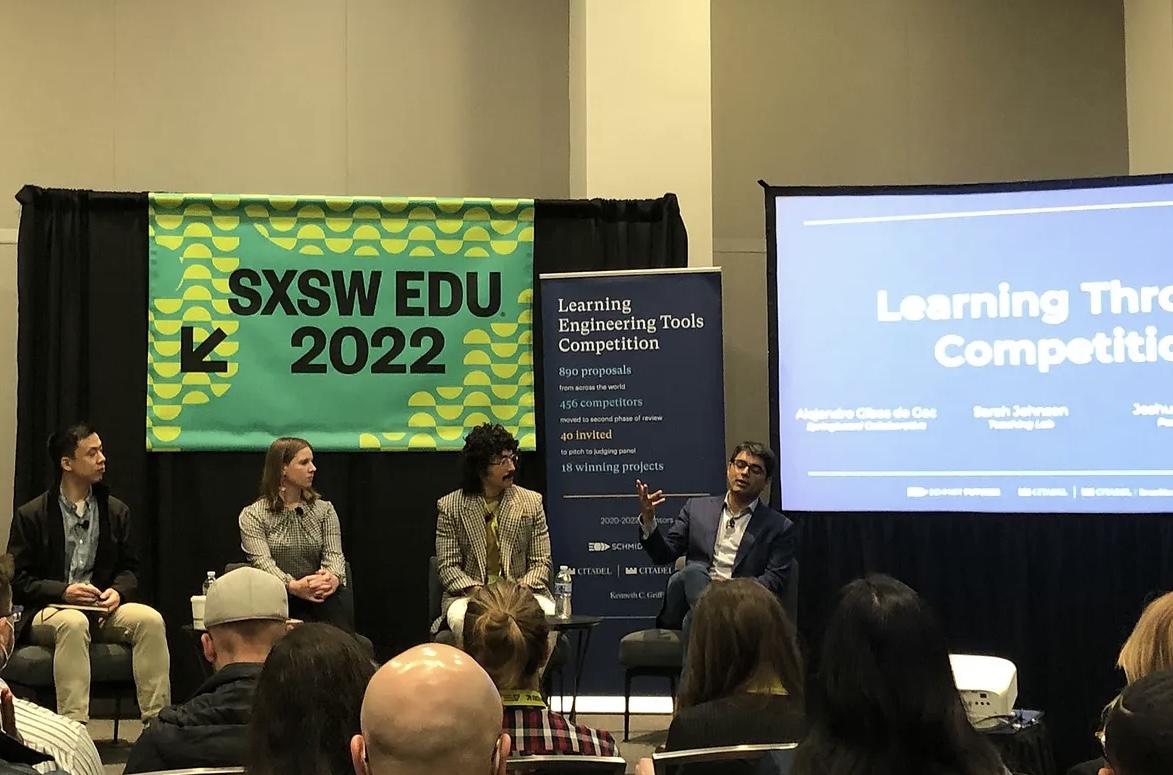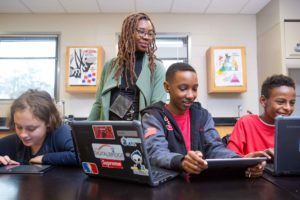
Technology is evolving rapidly. And ed tech needs to evolve with it in order to better advance how students learn and teachers teach.
Teaching Lab, a 2020 Tools Competition winner, recently put this theory into action and is now changing how education technology is brought to market and into classrooms by creating a new funnel for ideas and innovation. This spring, Teaching Lab, whose non-profit mission is to transform the virtual teacher learning experience to accelerate K-12 student learning, acquired 2020 Catalyst Prize winner Podsie. Additional non-profit acquisitions are planned at a rate of three to five per year.
The result: a new “Innovation Studio” incubator that employs a “lift as you climb” approach designed to transform how learning engineering (LE) and ed tech organizations grow and support education advancement.
“It’s really inspired by the Tools Competition,” said Teaching Lab CEO Sarah Johnson of the studio. We saw “that there were many small organizations that were getting funded and had really great leadership, great technology, and great algorithms but it seemed like they needed to be stacked to really benefit students in the way that they were intended to benefit them…like each one had a piece of the puzzle but not the whole picture.”
This new non-profit merger and acquisition model of one non-profit by another represents an evolution for such organizations – one that leaders hope can significantly improve the way in which nonprofit education innovators are resourced and supported as they develop, scale and implement ideas to accelerate student learning.
“We hope to be leaders in the space of non-profit M&A for impact and non-profit M&A informed by educators and their needs and pain points. That in and of itself is an innovation and will be a success because it has rarely been done,” Johnson said. “Additionally we really hope to accelerate product innovation and product improvement of the organizations we acquire.”
“Already, even though we just acquired Podsie, we’re already seeing that,” she said. “The minute they joined we were able to get funding from [investment firm and Tools Competition sponsor] AlleyCorp to get in-kind support for several engineers to work on a math product that Podsie is developing. That probably wouldn’t have happened if they weren’t at Teaching Lab.”
Podsie and Teaching Lab found each other through the Tools Competition at Demo Day. This event was hosted at SXSW EDU for Tools Competition winners to demo their tools one year after winning the competition. Johnson and her team recognized the synergy that could be found by working with Podsie. In 2020, the young start-up won the Tools Competition for its personalized review tool that improves memory recall through learning science best practices.
Podsie CEO and former teacher Joshua Ling, is now senior director of the Podsie Innovation Lab at Teaching Lab’s Innovation Studio.
“There’s so much overlap with our missions,” said Ling. “At Podsie we’re trying to bridge the gap between research and education in order to empower teachers and improve student learning outcomes.”
There is a shared goal to ensure that teachers have access to evidence-based practices. There is also a better and stronger path to implement new ideas.
“At Teaching Lab, they have a lot of on the ground, in-person work that they’re doing,” Ling said. “They actually meet with teachers. Whereas we’re purely a tech-first solution and we needed to be much more on the ground and actually interacting with teachers to understand how we build this tech product to truly serve their needs. Because of that I think there was a very natural fit (with the merger).”
Podsie’s free learning tool for teachers helps middle and high school students remember what they’ve learned and makes it easy for teachers and students to review those lessons in an efficient, personalized way. With Podsie, students retain more information in the long term while spending less time studying.
Why Now And What’s Next
Following the upheaval of COVID and the resulting global learning loss among students, there has never been a greater need or willingness to identify and develop ed tech and learning engineering solutions to get young learners back on track.
More government and private funding, including nearly $190 billion in federal money for the Elementary and Secondary School Emergency Relief (ESSER) Fund, helped spur an influx of innovators who came to the table with exciting approaches to reinvigorate K-12 education. Programs like the Tools Competition, which will soon announce its slate of 2022-23 winners are also committed to discovering and developing new LE innovations.
There is also more willingness than ever before to embrace and incorporate ed tech among schools, administrators, and teachers. But the sustained support of these great ideas and products still remains disparate. Too frequently, new education innovators are left to operate in under-resourced silos as time goes by. Without a way to help them realize widespread, next-level implementation that can truly help the most kids in the most need, many promising initiatives and tools founder.
That’s where the Innovation Studio is hoping to step in – as it did with the Writing Pathways resource that also lives under Teaching Lab’s Innovation Studio umbrella with Podsie.
The Writing Pathways Initiative develops research-based writing instruction guidance for teachers, said Jessica Azani with the project. Research studies were underway and best practices for teachers were being explored when funding ran out. It looked like the work would be for naught. This was alarming on many levels – including the often-overlooked need to help teachers instruct students on how to write well. The work is hard, it’s not tested the way that reading and math skills are, and it does not have a large pool of research-based guidance for teachers.
“The solution right now is teachers figure it out on their own in schools. That’s not fair,” said Phil Weinberg with the Writing Pathways Initiative, which joined the Innovation Studio last July.
“Kids are not getting this preparation. Oftentimes, the ability to write is a barrier when it comes to employment… (and) to miss a basic skill in terms of helping students meet the world where they can and should, seems like a terrible, terrible mistake.”
Teaching Lab leaders agreed. Upon learning of Writing Pathways’ dilemma they saw an opportunity not only to mirror the mission of the Tools Competition, but to amplify it.
The Innovation Studio, which is remotely-based, will soon hire a Chief Innovation Officer to lead it as well as directors and managers who are experts in mergers and acquisitions. Fundraising for the studio to support all of the organizations that join it will also be ongoing so that the incubator can continue to grow and help other nonprofits toward a goal of becoming self-sustaining.
“At Teaching Lab we have over 50 school system partnerships, we have thousands of teacher users serving thousands of students so we saw an opportunity to bring organizations that were smaller into Teaching Lab and get them more access to users and business,” Johnson said. The studio “will accelerate the development and improvement of their products and also create stacked interventions that could create more coherence when implemented within school systems and schools and classrooms.”
It is a bold model, and a brave one, say its participants.
“Ed tech organizations have the moral responsibility to make sure that whatever they’re building is truly teacher and student-centered and actually improves student outcomes.” Ling said. “I’m excited about the Innovation Studio because I think we have the opportunity to start something that’s harnessing this powerful new technology and because we’re doing it under a non-profit, mission-driven oriented organization where our bottom lines are literally student outcomes and teacher empowerment. I think we have an opportunity to fill a void in this whole ethics space.”
Added Weinberg: “Too often solutions that can be sold to schools are produced quickly in order to stay alive (so) it’s really heartening to be in a place where there’s a long-term vision that understands that we need to put out tested, researched products. Because at the end of those products it’s not about making money, it’s about making students’ lives better.”



